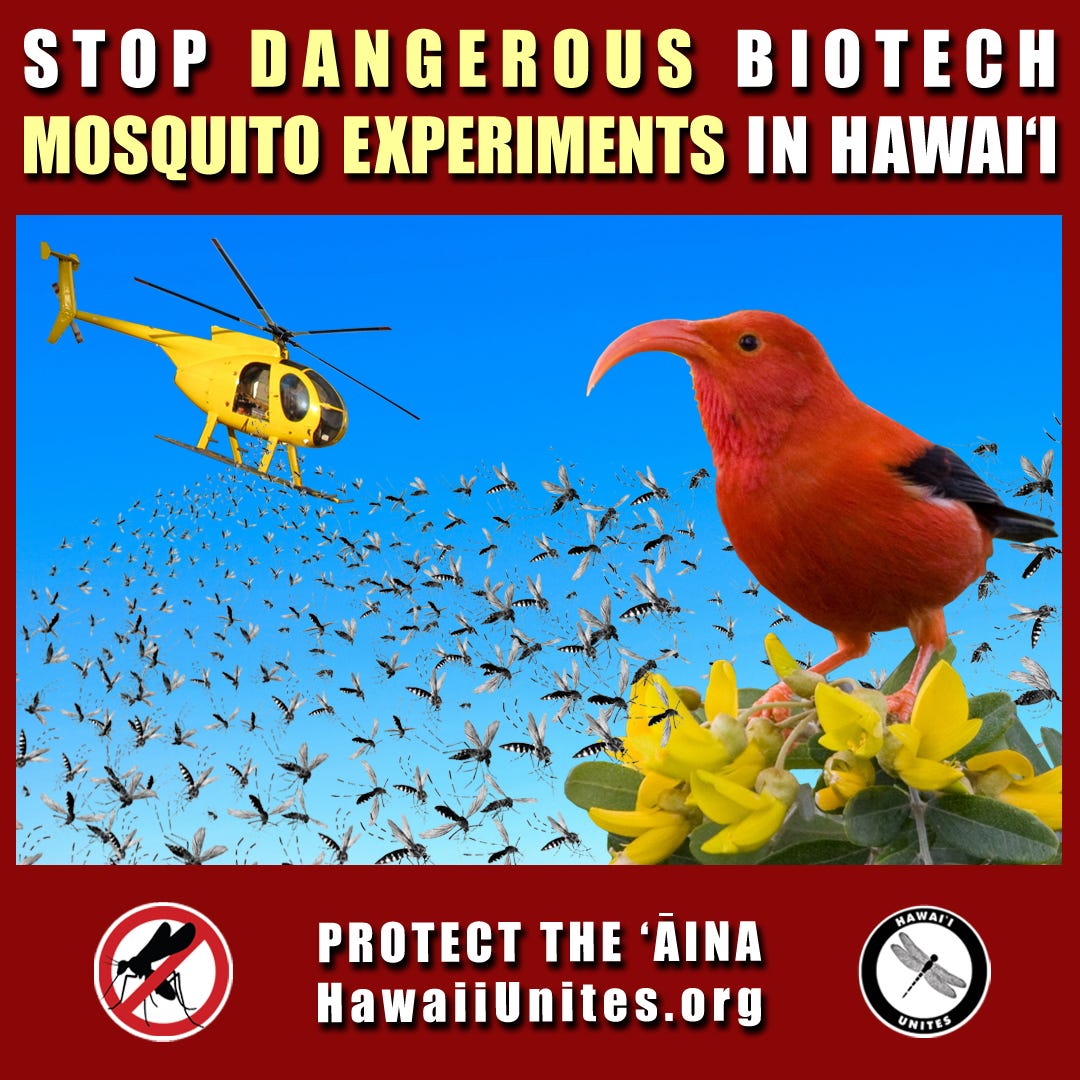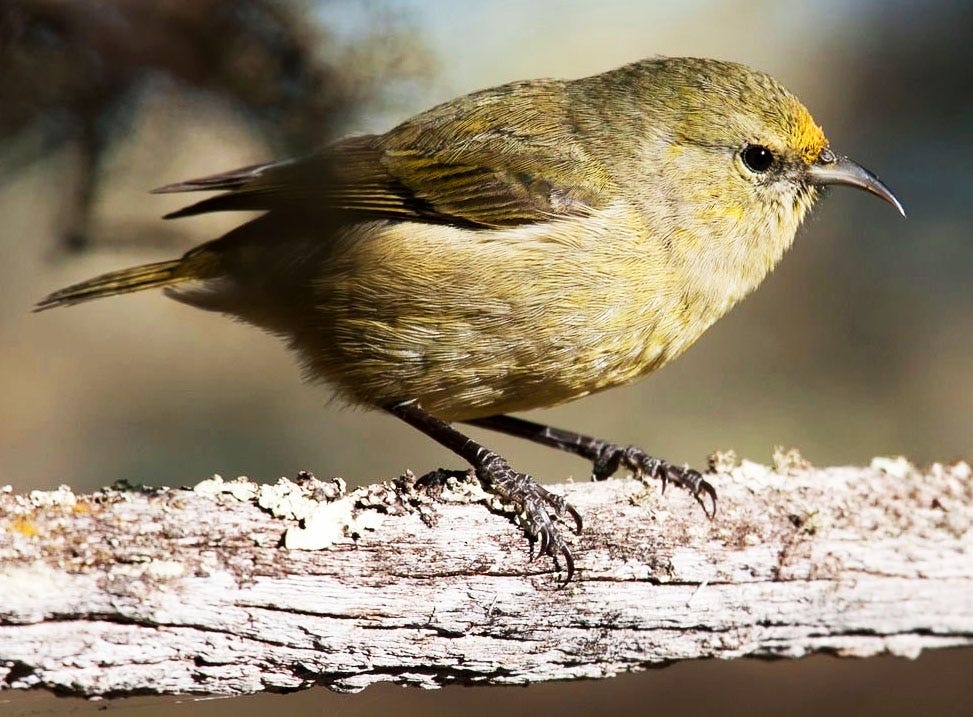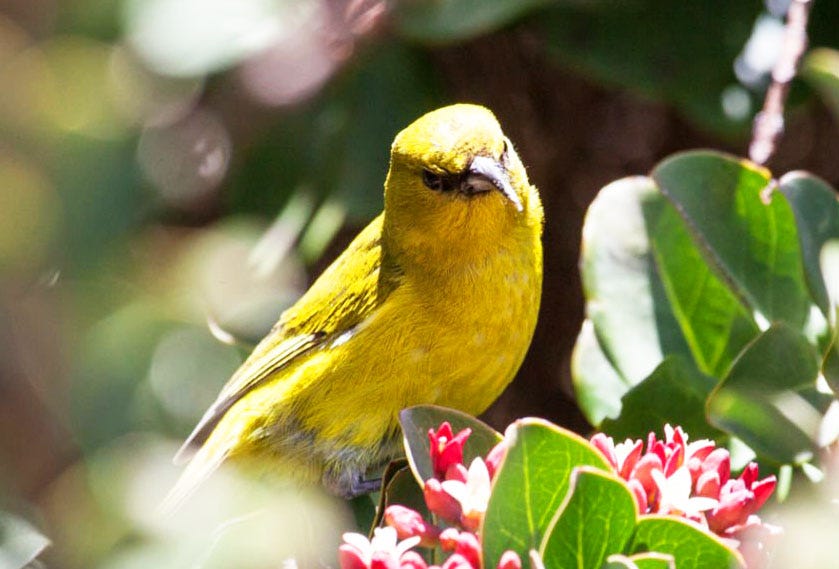Open Letter to NPR: Tell the Whole Story about Hawai’i Mosquito Experiments
Why is NPR promoting dangerous biotech experimentation on sacred lands in Hawai‘i?
This is an open letter to the editors at National Public Radio (NPR). Your news outlet describes itself as “an independent, nonprofit media organization that was founded on a mission to create a more informed public.” When did your mission change to one that silences the voice of the people speaking out against the use of our natural environment as a petri dish for reckless biotech experiments?
In early February, NPR reporter Lauren Sommer reached out to me requesting an interview for her report on the mosquito release project on Maui. Sommer and I met and spoke at length about Hawai‘i Unites’ court case challenging the dangerous bacteria-infected mosquito plan. I explained the details of our case and the serious risks of the mosquitoes to the health of our islands’ people, wildlife, and ‘āina. Sommer seemed interested to hear about our extensive research. We talked about the scientific expert opinions and about the facts disclosed in the documents of agencies involved in the project. I explained the peer-reviewed studies showing the potential for the Wolbachia bacteria in the lab-altered mosquitoes to cause increased disease-spreading capability. I even provided links to those studies directly to her on request following the interview.
I had left that meeting hopeful that, in the spirit of creating “a more informed public,” your correspondent would present a balanced, factual story and allow readers to decide for themselves how they feel about this issue. Imagine my surprise to see Sommer’s corporate propaganda piece published by NPR this month.
Hawai‘i Unites is a volunteer, grassroots nonprofit environmental organization that is funded by the community. Thousands of people stand with us in challenging this dangerous biotech agenda on our islands. Our mission honors the ancestral connections of the native birds and the ‘āina, and we’re determined to protect these sacred lands and the health of Hawai‘i’s people, animals, and ecosystems.
In an article with over 1,600 words, our voice was silenced – reduced by NPR to a single sentence dismissing all of our concerns about this heavily funded mosquito project:
“It’s already survived a legal challenge from a group opposed to the releases.”
Let me assure you that this legal challenge is far from over. With the support of our community that is overwhelmingly opposed to these mosquito releases, Hawai‘i Unites filed an appeal seeking a ruling that our case be remanded back to the circuit court and go to trial. Our case is active, strong, and moving through the courts.
The imagery included in NPR’s article is disturbing. It’s difficult to look at the prison-like enclosures that these beautiful native honeycreeper birds are living out their lives in. Brought into captivity “for safe-keeping” by these agencies, the birds are deprived of their natural habitat, their ancestral lands, and their freedom. As environmentalists, we ask what detrimental effects human interventions are having on these honeycreepers – including stress caused by capture and confinement in bird-carrying boxes and at captive care facilities, attachment of irradiating VHF radio transmitters, taking of eggs from parents’ nests, and disruptions from mosquito release helicopter activity.
The NPR story notes the death of translocated birds from a 2019 science experiment gone wrong on Maui. Scientist and activist Arthur Firstenberg described the real details of this tragic incident in his 2023 article, “Don’t Irradiate the Birds!” This irradiation of critically endangered native birds involved the attachment of VHF radio transmitters to the legs of 10 kiwikiu honeycreepers, and the subsequent deaths of seven of those birds:
“The birds – some captive-raised and some wild – were released into the forest between October 27 and October 30, 2019. By November 16, every bird was dead except the three who had succeeded in removing or disabling their transmitter. The details are shocking.”
Firstenberg questioned whether stress caused by radiation from the transmitters and from the giant antenna farm towering over the Nakula Natural Area Reserve could have been the cause of those deaths. He further suggested that irradiation of birds is an environmental stress factor that could lead to rapid development of avian malaria and to death from the disease.
Along with glorifying the “aggressive level of intervention that humans are engaging in” while at the same time questioning whether the experimental mosquito interventions will even be effective, your NPR article openly admits that these birds are already developing a natural immunity to avian malaria.
“Ultimately, the hope is that Hawaii’s honeycreepers will develop immunity to avian malaria, as birds in other places have done. And there’s already been a sign it could be possible. Recently, one of the kiwikiu that was thought to be dead reappeared, far from where he was released, having survived malaria.”
Because of aggressive interferences by these agencies, we may never know whether the honeycreepers, including kiwikiu, targeted by these projects might develop a natural tolerance and resistance to avian malaria if left alone in nature. ‘Amakihi honeycreepers already have developed that tolerance. Certainly, a case could be made for less direct intervention with these birds. There’s no question that alternatives to risky, unstudied mosquito mitigation methods need further consideration. Refocusing on habitat and stream flow restoration would be a much more environmentally sound approach that would honor the ‘āina, the culture, and the ancestral connections of the native birds.
Last month, our community once again voiced strong opposition to these bacteria-infected mosquito releases in Hawai‘i. 100% of testimony on the mosquito agenda item for the Board of Land and Natural Resources meeting was against this dangerous project. We don’t want this desecration of our natural environment to continue.
“Serious concerns about this plan have not been adequately addressed. The agencies involved in this project have lied about the introduction of foreign organisms into the islands and about the release of female mosquitoes that bite, breed, and spread disease. On Maui, these agencies are also flagrantly deviating from the approved plan, increasing the risks of helicopter fire and accident incidents.
Southern house mosquitoes transmit diseases to people and animals, and pathogen screenings are not being disclosed. Wolbachia bacteria can cause mosquitoes to become more capable of spreading diseases. The agencies releasing these lab-altered mosquitoes have admitted that the plan does not include monitoring the effects of the experimental mosquitoes on forest birds. This project has the potential to cause the extinction of the native birds it is meant to protect, and it could impact the health of the people. I demand an environmental impact statement.”
Because the agencies involved in this project have chosen to release the mosquitoes solely by helicopters rather than by drones for several months longer than was approved, there’s even more of an impact on the birds and their habitat. Your NPR article includes photos of one of these helicopters loaded up with a quarter of a million invasive mosquitoes ready for a release flight. Strapped to that helicopter is a clear tube presumably used to airdrop the cardboard packages filled with mosquitoes into the forest. This too is a deviation from the approved plan. The helicopter longline release system described in the final environmental assessment for this project is not the system being used, which appears to be causing the helicopters to fly closer to the tree canopy than the 150 to 200 feet AGL (above ground level) stated in that document. Per our court case:
“This is important because it deviates from the approved plan and increases the potential for adverse impacts such as noise disturbances; nesting, breeding, and roosting disturbances; helicopter rotor wash; accidents and collisions; and wildland fires.”
NPR quotes Chris Warren, forest bird program coordinator at Haleakalā National Park on Maui, as saying that “the only thing more tragic than these things going extinct would be them going extinct and we didn't try to stop it.” I would say there is a much more tragic scenario on the horizon here. These agencies conducting reckless biotech experiments in our fragile ecosystems could end up being the very reason these native birds become extinct.
Hawai‘i Unites will continue standing up for the voice of the people challenging these dangerous lab-altered mosquito releases. We are well aware that this is a David and Goliath battle and that millions of dollars are motivating this biotech agenda. We won’t back down. The question is, will “independent” media outlets like NPR continue acting as propagandists for corporate interests, or does your organization have the journalistic integrity to tell the whole story about these mosquito experiments in Hawai‘i and the growing movement to stop the use of sacred lands as testing grounds?
Our court case can set a precedent that will strengthen Hawai‘i’s environmental laws for all islands and impact the course of this agenda globally. Tax-deductible donations to Hawai‘i Unites help us continue our mission to protect the ‘āina.
Mahalo,
Tina Lia
Founder
Hawai‘i Unites
HawaiiUnites.org
Hawai‘i Unites is a 501(c)(3) nonprofit organization dedicated to the conservation and protection of our environment and natural resources. Your tax-deductible donations help us to fulfill our mission of honoring and protecting our sacred connection to the natural world.
Report a Mosquito Bite
The State of Hawai‘i and its multi-agency partnership Birds, Not Mosquitoes have been releasing bacteria-infected mosquitoes in East Maui and conducting pilot study releases on Kaua‘i since 2023. As part of our ongoing research and documentation, Hawai‘i Unites has been compiling reports from throughout the islands about unusual mosquito bite reactions. If you’ve been bitten by a mosquito and would like to report the incident, please complete our Mosquito Bite Incident Report.






This letter to NPR is fabulous. I testified in Honolulu on May 10, 2024, against the mosquito release.
Which is worse, Americans' inablity to understand that the Lahaina fire was an attack, or Americans' inability to see that the mosquito thing is -- similarly -- an attack?
Wake up, People! If you change your mind later about these things, you won't be able to get those skeeters back into the bottle. You won't be able to get those skeeters' great-great grandchildren back into the bottle either. OMG, what madness!
Will the Medeiros lab be opposed by the Medeiros mayor in 2027?
"Under the direction of senior investigators Margaret McFall-Ngai, Ned Ruby, and Marilyn Dunlap, junior investigators Kiana Frank, Floyd Reed, Joanne Yew, Masato Yoshizawa, and myself will investigate independent but overlapping projects that all explore how microbes mediate the link between the environment and human health. Our work will focus on the environmental and ecological forces that modulate the assembly of the mosquito microbiome. Big thanks to the Honolulu Star-Advertiser, Hawaii News Now, and KITV news for sharing our work."
Press release for $10.4M grant from NIH
"...how microbes mediate the link between the environment and human health"
http://www.medeiros-hui.com/news
https://thepascorrupt.substack.com/p/space-force-requests-comment-from